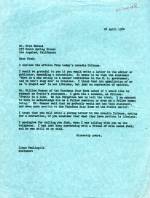|
Pauling’s resolute stand made him an even greater hero within the peace movement.
At a rally in New York two weeks after his final SISS appearance, more than 2,000
people turned out to hear him; hundreds more had to be turned away. His ordeal with
the Senate ended up a triumph, in a way, but Pauling was also deeply angered by the
experience -- an anger that he translated into a series of libel suits against media
that continued to attack him as a Communist dupe. He launched five libel suits during
the year after his SISS appearance, and stopped only when US law was changed in ways
that made it very difficult for public figures to claim libel.
Through it all, Pauling seemed to grow increasingly thin-skinned, less able to accept
even casual references to him as "a semi-prominent American loudmouth," as one newspaper
put it in a phrase that spurred a half-million-dollar Pauling lawsuit. Turning away
from the media, Pauling started criticizing a group he called "egghead millionaires,"
researchers who parlayed their talents into fortunes working for the defense industry
making bigger and better weapons. To Pauling, the egghead millionaires were ultimate
symbols of the betrayal and corruption of the sciences. It all seemed to divert him
from his major work against nuclear weapons. Pauling, at the peak of his renown as
a peace activist, seemed to be growing increasingly cranky, litigious, and impolitic
-- a loose cannon as much as a moral leader.
|
|
Click images to enlarge

"Rare Courage." October 12, 1960.

Letter from Linus Pauling to Fred Okrand. April 28, 1960.
"There’s no doubt that we have in this country a very powerful group of people, 'defense
contractors,' so-called, who are profiting greatly from the military activities, and
who will oppose international agreements that lead to a decrease in the military budget."
|

